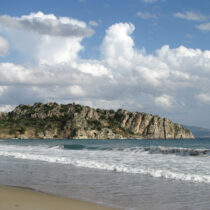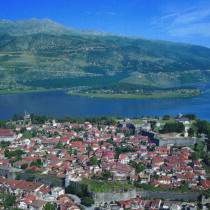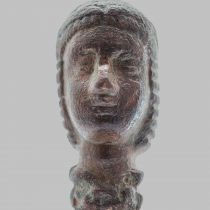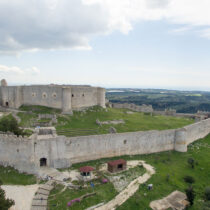Mote of Urr excavation published after 65 years
The results of Brian Hope-Taylor’s excavation of the Mote of Urr have been published 65 years after it was excavated.
A ring belonging to Pontius Pilate has perhaps been found in Israel
The ring had been discovered 50 years ago during excavations at the archaeological site of Herodion near the West Bank of Bethlehem.
Study puts the Neotropics on the map of the world’s food production centers in antiquity
Sambaqui societies had sophisticated diet; study suggests that hunter-gatherer communities living in coastal Atlantic Forest areas between 8,000 and 1,000 years ago consumed a range of plants and more carbohydrates than expected for the period and region.
Artificial intelligence for studying the ancient human populations of Patagonia
Argentine and Spanish researchers have used statistical techniques of automatic learning to analyze mobility patterns and technology of the hunter-gatherer groups that inhabited the Southern Cone of America.
Ancient populations from different Caucasus regions had strong social connections
Research group from Russia and the United States analyzed samples of obsidian volcanic glass in Kabardino-Balkaria.
Greek Culture in the Roman World
The American Classical League invites scholars and teachers to submit abstracts for its affiliated group panel session, "Greek Culture in the Roman World".
Ancient Egypt and New Technology Conference
Abstracts will be accepted through December 31, 2018 for a conference on Ancient Egypt and New Technology, to be held at Indiana University - Bloomington on March 29-30, 2019.
Opening in China of the exhibition of the National Museum of Contemporary Art, Greece
In the exhibition entitled “At the beginning was the word. Concepts - Images - Script″ 40 Greek and foreign artists are participating with 80 works that belong to the permanent collection of EMST.
New archaeological site revises human habitation timeline on Tibetan plateau
Human ancestors first set foot on the interior of the Qinghai-Tibetan Plateau around 30,000-40,000 years ago, according to new research by scientists from the Chinese Academy of Sciences.
Oldest-known ancestor of modern primates may have come from North America, not Asia
About 56 million years ago, on an Earth so warm that palm trees graced the Arctic Circle, a mouse-sized primate known as Teilhardina first curled its fingers around a branch.
The ‘Chinese Pyramids’ and the pole star
All the emperors of the the Western Han dynasty chose to be buried under 'Chinese pyramids'.
France returns 26 looted works of art to Benin
The decision followed the submission of a report recommending the return of cultural artefacts taken from Africa in the colonial period.
Stone tools linked to ancient human ancestors in Arabia have surprisingly recent date
Beginning more than 1.5 million years ago, early humans made stone handaxes in a style known as the Acheulean – the longest lasting tool-making tradition in prehistory.
9,000-year-old stone mask unveiled in Israel
The mask from Pnei Hever joins other masks attributed to the Pre-Pottery Neolithic B period discovered in the southern Hebron Hills.
USA returns parts of a Roman mosaic to Turkey
The twelve sections of the mosaic were found in the ancient city of Zeugma, near the modern Turkish town of Gaziantep and depict human faces and birds.
Prehistoric cave art reveals ancient use of complex astronomy
Some of the world's oldest cave paintings have revealed how ancient people had relatively advanced knowledge of astronomy.
First ancient DNA from mainland Finland reveals origins of Siberian ancestry in region
New study shows that the genetic makeup of northern Europe traces back to migrations from Siberia that began at least 3,500 years ago and that, as recently as the Iron Age, ancestors of the Saami lived in a larger area of Finland than today.
Remains of Anglo-Saxon cemetery discovered
Excavations have revealed more than 20 burials at the extraordinary cemetery in the Lincolnshire Wolds dating back to the late fifth to mid sixth centuries AD.
Siberian ‘unicorns’ extinct much later than believed
New research has shown that the so-called Siberian unicorns lived much longer than was believed, and probably did not become extinct until ‘just’ 39,000 years ago.
Charter for the Protection of Byzantine Heritage Monuments
The European Centre for Byzantine and Post-Byzantine Monuments organizes from Friday 30 November to Sunday 2 December the 4th International Conference on "Byzantine Monuments and World Heritage".
New data from excavations in the Thermaic Gulf
New data resulting from archaeological excavations over the last decades in the region of the Thermaic Gulf was presented at an event organized by the Greek Archaeological Committee UK at King’s College, London.
2nd Call for Papers: Annual Meeting of UK and Eire Postgraduates in Ancient History (AMPAH)
The AMPAH 2018-2019 organising committee is pleased to announce the second call for papers for the next Annual Meeting of UK and Eire Postgraduates in Ancient History (AMPAH).
Mosaics & Power: From Ravenna to Sinai
The lecture will survey the immense range of Byzantine mosaic decoration of the sixth century, concentrating on the reign of Emperor Justinian.
Postgraduate course in Linear B and Mycenaean Greek
This intensive two-week course, based on site-visits, lectures, seminars and practical classes, introduces students to the Linear B script used in the Late Bronze Age Aegean.




























